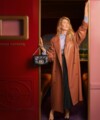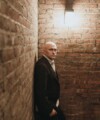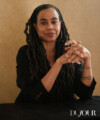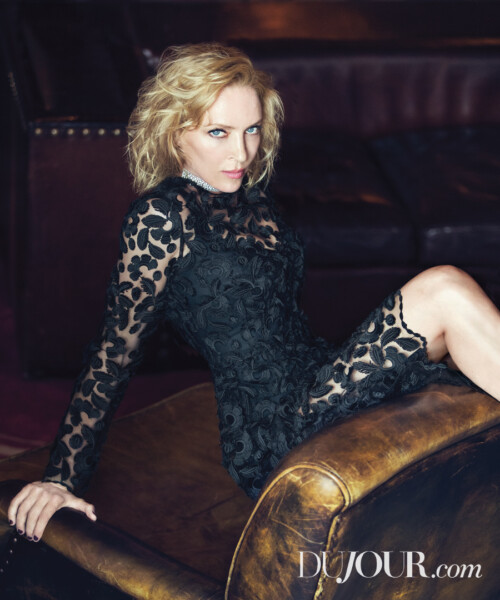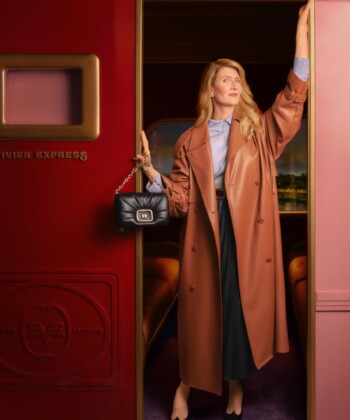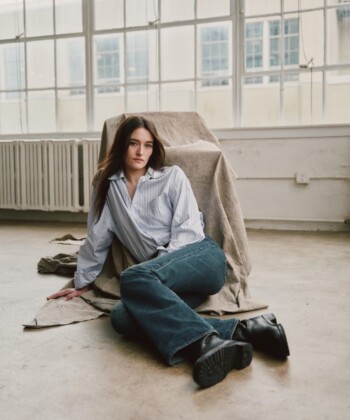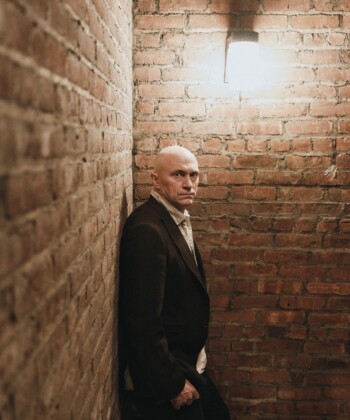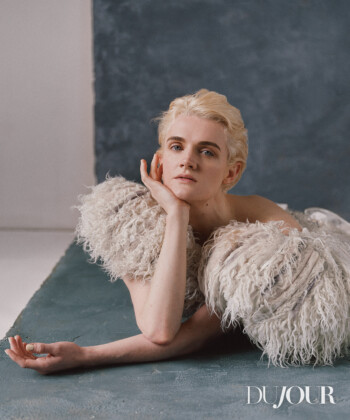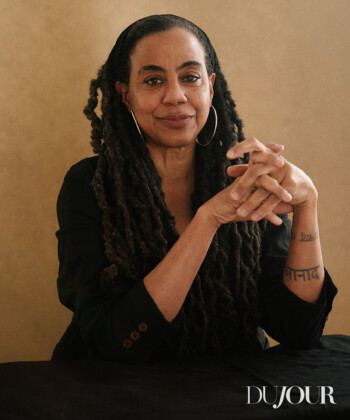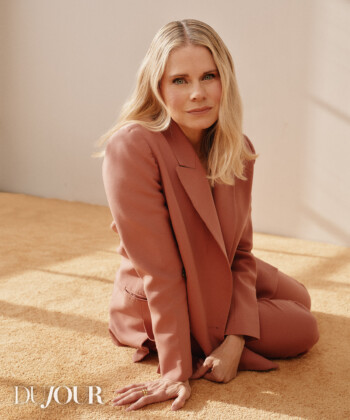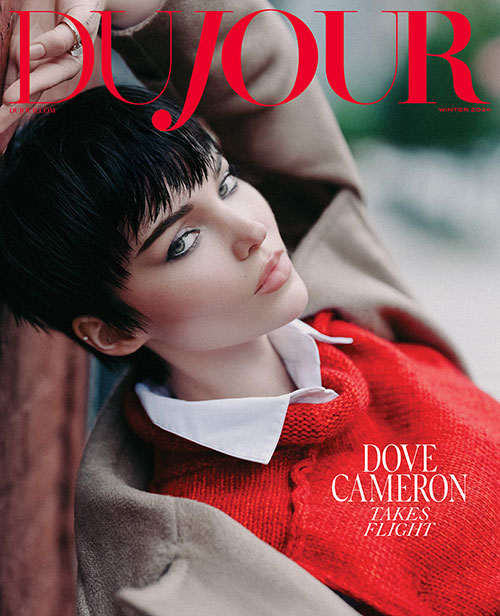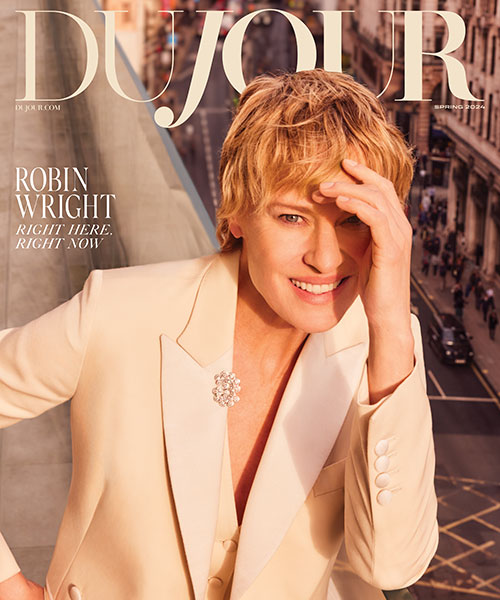You notice the voice before anything. Preceding her as she makes her way down the hall, the alluringly husky tone is striking, and causes you to sit up a bit straighter, while also being comfortingly familiar. When the woman herself arrives and sits down next to you, managing an impossibly impeccable all-white outfit on a sweltering day, it’s clear that her voice is part of a presence that’s remarkable in every way: enviable height, a distinct self-assuredness and a regal bearing rounding out the package.
Today Uma Thurman has something to be very happy about. In November she will be making her first appearance on Broadway and she beams at the very mention of it. This is a milestone, and a considerable challenge that she’s very ready for. “I couldn’t possibly be more excited. I’m just sort of getting my head around the prep,” she says, seated on a velvet sofa on the Gramercy Park Hotel’s terrace. While official rehearsals don’t begin for two months, she’s about to begin full-time preparations and seems as energized about it as one can possibly be.
The project is titled The Parisian Woman, but actually revolves around an ambitious Washingtonian, Chloe, and the lengths she goes to help her husband (played by Josh Lucas) secure a powerful position in the modern-day political landscape. Based on La Parisienne, a 19th-century French comedy by Henry Becque, it was written by House of Cards creator Beau Willimon, whose celebrated 2008 play Farragut North was based on his experience as a staffer on Howard Dean’s 2004 presidential campaign. “He’s an inspiration, actually,” Thurman says. “His writing is so sharp and so witty and funny and dry and fast and also deep and provocative.”
Willimon, who also worked for Hillary Clinton and Bill Bradley, helped start the advocacy group Action Group Network in response to the 2016 election and, in February, tweeted a 25-point Declaration of Resistance to the President; so it’s likely the specter of Trump will loom large. Those overtones are something that Thurman’s hoping to move towards, not away from. “I think you have people withdrawing from the world and others who know that this is the time to pull in,” she explains. “The play goes inside the lives of people who are in this moment. Who are real human beings with relationships and agreements and marriages and feelings and conflicts. It’s a bit funny. How can it not be in this moment of time?”
It’s surprising that Thurman’s thirty-year career hasn’t yet included a stop on Broadway. She’s clear to note that that’s not for any lack of interest on her part. In fact, it’s been a much focused-on career goal that she’s carefully plotted, waiting for just the right time. The moment came when she received an introduction to the Tony-winning theatrical director Pam MacKinnon, who was already at work on The Parisian Woman and was eager to have Thurman read it. “My dream was that I would find a piece of modern contemporary writing, that that would be what would come to me, and this is exactly it. From experience I knew and was always thinking that I wouldn’t go and do a play without a superb performance director,” she recalls. She loved it immediately and began appearing in table reads for investors with the hopes of being able to bring it to Broadway.
The time is right for a new challenge. In prior years, finding the time to even see a Broadway show was difficult. Her oldest child, daughter Maya Thurman-Hawke, a model and student at Julliard, is 19 years old, son Levon Roan Thurman-Hawke is 15 and Luna, Thurman’s daughter with former fiancé Arpad Busson, just turned five. “I’m finding myself a little freed up,” she says. “Twenty years of having a child somewhere in the super neediest ages has its blessings and its challenges to your time; but I think I’ll be able to get out more in the future.”
Thurman, now 47, has been actively working since she was a teen, appearing on the cover of British Vogue at age 15 and leaving the Massachusetts boarding school Northfield Mount Hermon for New York’s Professional Children’s School. By 19 her CV included four films, among them The Adventures of Baron Munchausen and Dangerous Liaisons. Early on she began working with iconic directors: Stephen Frears, Ted Demme and Quentin Tarantino, a longtime collaborator who cast her in Pulp Fiction and Kill Bill. To this day, the ability to work with a director she loves is one of the top things that draws her to a project, even ones she might not otherwise have considered. “I think as a teenager starting out in the time where auteur filmmakers were the king of the cinema, I was very impacted by that,” she says. “Sometimes you get everything: the part is perfect, there’s a lot for you to do, you love the other actors, you love the director, the script is brilliant. Sometimes it’s not necessarily so obvious but you love that director’s work and so you put yourself in their hands.”
One example is Lars von Trier’s upcoming The House That Jack Built, a graphic look at the life of a serial killer (Matt Dillon), in which Thurman plays a murder victim. The script has been called shockingly violent, even by the standards of boundary-pushing von Trier. (The director has said it was so off-putting that even actors eager to work with him passed on it.) The disturbing subject matter was difficult to tackle and Thurman admits it’s not likely she’d have taken the role were it not for the involvement of von Trier, who directed her in the film Nymphomaniac. “It’s a very difficult script. It’s really out of love for him and support for him as an artist that I would be like oh, God, okay, we’ll try it. He liked to tease that I was obviously illiterate because I would have to be crazy to be in the movie. Fair enough,” she says. “It’s savage. It’s brutal. It’s about brutality; sad, twisted humor that’s also tragic and horrifying.”
That thought leads her to admit to her conflicted emotions regarding violence in entertainment. “I myself don’t really like violence but I have made some films that have violence and violence is in the world and it’s part of a lot of great artists’ work,” she admits. “I don’t like it in the world and I don’t really enjoy it in art. I don’t find it enjoyable. I’m not the kind of person who wants to go see people get shot up for fun but it has its place in the arts.” It’s an opinion that might seem incompatible with a body of work that’s been heavy on violent imagery, but also a refreshingly candid insight into some of the compromises inherent in a Hollywood career.
A step in a different direction is October’s War With Grandpa, a family movie that reunites Thurman with Robert De Niro (the titular Grandpa), her co-star in 1993’s Mad Dog and Glory. It’s not typical Uma fare. “I’ve never made a movie quite as sweet as that,” she says. But her comedic ability, though cited less often than her dramatic work, is something she’s always valued. “I like comedy. I have an attraction to comedy. It’s wonderful to break it up. It can also very difficult because it’s very harrowing. It’s either going to be really bad or funny.”
What’s even more harrowing to Thurman in this moment is readying herself for center stage. She’s well aware of the physical and emotional toll that eight shows a week has on a person and isn’t taking it lightly. “It’s so much work. I’m scared. I feel like I’m at the base of a very steep incline,” she says. “It’s going to be challenging beyond words. I’m going to do just about whatever I can.” There’s no doubt that she will and that the results will be sublime.


